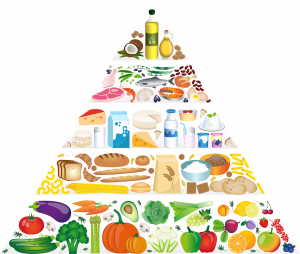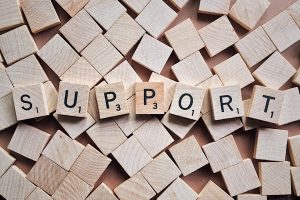27 Healthy Study Habits
Brianna De La Riva
This chapter will explore and examine healthy study habits for you to promote academic achievement and good health. This chapter will provide strategies to help you achieve a healthy balance between your academic and personal life. Topics covered will range from the social, physical, cognitive, nutritional, motivational, and emotional aspects of life and positive coping mechanisms.

Do you really get enough sleep?
The University of Georgia has found that, on average, most college students get 6-6.9 hours of sleep per night, and the college years are notoriously sleep-deprived due to an overload of activities. It is suggested that establishing a consistent sleep schedule and maintaining between 7-8 hours per night is beneficial. Lack of sleep causes a physical toll on the body and brain, leading to fatigue of the body and it affects mental acuity. Tips for maintaining a healthy sleep routine is by having one, a set time to wake up and go to bed at the same time every day. Avoiding caffeine before bedtime, avoid eating within two or three hours of your planned bedtime, and avoid alcohol or nicotine before bedtime.
Healthy Food Habits

Many of you opt to fast food drive-thrus rather than making a home-cooked meal, saving time for your studies. This leads to overall poorer health; fast food is high in sodium, sugar, and calories. This diet can lead to diabetes, obesity, and cardiovascular diseases. For a healthier diet, you should be consuming more plants and nuts. Batch cooking solves the dilemma between time and healthier eating. Stews, casseroles, or soups are healthier meals to cook at the beginning of the week and frozen until needed.
Motivational Strategies
You may occasionally lack motivation in your educational endeavors, the long hours of studying, and sacrifices in life to ensure excellent grades may take its toll. Despite the massive amounts of students entering college, it has been found that not all will persist and earn college degrees. Motivational strategies remind you that your purpose is to achieve your goals. Begin by setting small, specific, realistic goals to achieve self-efficacy. Visualizing yourself walking across the stage to earn that degree and how it will change your life.
Cognitive Health
It is crucial that you maintain your mental and emotional, cognitive health. Academic achievement is important as a marker of positive adjustments, academic achievement sets the stage for future educational and occupational opportunities. It’s imperative for you to be cognizant of your cognitive health and how to maintain it. Negative thoughts such as, “It’s the worst that I failed that test!”, instead think, “It’s not good I failed that test, what resources are available for me to improve on my next one?”. Most importantly, stay positive and have a support system.
Social Health

You will utilize practical communication skills throughout your life, inside and out of your academics. Writing, reading, being able to work with a diverse work team, and having the social skills required to be successful in a career and in society are qualities that go beyond merely earning a credential to compete for a job. Tips to improve social health include regularly contacting student support services if you are feeling socially isolated; PVCC counseling center is available for any of you needing to speak on any personal or academic matters. Be involved with school clubs to associate yourself with like-minded individuals with similar goals. But most importantly, remember to follow your passions and have some fun!
Emotional Strategies
The stress of academics may lead to various emotions within you, ranging from happiness to depression. You will need to learn and utilize coping mechanisms. Emotional strategies that can be helpful include learning breathing exercises, practicing meditation, or saving time for personal reflection to recall all the “good” times. However, if you continue to feel distressed, it is essential to reach out to a professional or a friend. Also, if you have plans already in place things that might go wrong, it will put you at ease knowing you have them.
Local Resources

Some resources which may be beneficial towards assisting you during your academic career at PVCC are listed below:
- Mental Health Help: PVCC has free counselors here for you to help with anything from academic, personal, social, or career issues. While they do not conduct therapy, they do help you learn more about yourself and identify coping strategies to emerge with enhanced self-confidence and a clear path. Located in the KSC building, Room: KSC1220. You can find their link here.
- Disability Resources: An excellent resource for students is PVCC’s Disability Resources & Services. They provide information and services to students with any documented disability who are attending classes at PVCC. They strive to empower students, foster independence and promote achievement of realistic career and educational goals. For more information, you can find their link here.
- USDA National Hunger Hotline: From 7:00 AM – 10:00 PM Eastern Time. If you need food assistance, call 1-866-3-HUNGRY or 1-877-8-HAMBRE to speak with a representative who will find you local food resources such as meal sites, food banks, and other social services available near your location.
- Housing Help: The Department of Housing and Urban Development offers numerous resources for anyone who is experiencing or are at risk for homelessness or are searching for low-income housing. The Resource Locator offers a way for you to find local help by connecting with building managers, public housing authority representatives, and property management companies to inquire about housing issues, including availability.
Conclusion
In closing, it is important for you to keep in mind your physical, emotional, motivational, social, and nutritional health while pursuing your academic career. Maintenance of these aspects of health can promote overall well-being and good health, which may lead to further success in your educational pursuits. You need a balance between academics, health, and personal life to help maintain overall healthful well-being. These strategies described above can serve as a useful guide towards achieving this balance.
Media Attributions
- Dreams clouds sleep © Biljana Jovanovic is licensed under a CC0 (Creative Commons Zero) license
- food-pyramid-5329204_1280 © Image by dandelion_tea
- women-2586042_1920 © Image by StockSnap
- support-2355701_1920

